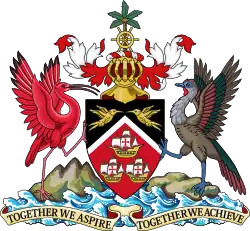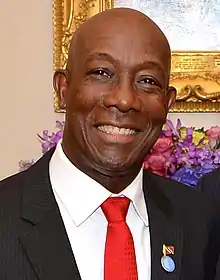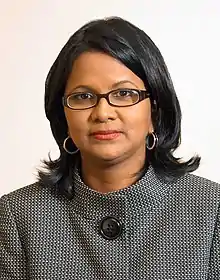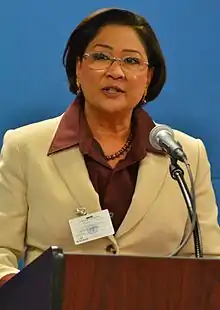Politics of Trinidad and Tobago
The politics of Trinidad and Tobago function within the framework of a unitary state regulated by a parliamentary democracy modelled on that of the United Kingdom of Great Britain and Northern Ireland, from which the country gained its independence in 1962. Under the 1976 republican Constitution, the monarch was replaced as head of state by a President chosen by an electoral college composed of the members of the bicameral Parliament, consisting of the Senate and the House of Representatives.
 |
|---|
| This article is part of a series on the politics and government of Trinidad and Tobago |
|
|
The country has remained a member of the Commonwealth, and has retained the Judicial Committee of the Privy Council in London as its highest court of appeal. The general direction and control of the government rests with the Cabinet, led by a Prime Minister. The Prime Minister and Cabinet are answerable to the House of Representatives. The 41 members of the House are elected to terms of at least five years. Elections may be called earlier by the president at the request of the prime minister or after a vote of no confidence in the House of Representatives. In 1976, the voting age was reduced from 21 to 18. The Senate's 31 members are appointed by the President: 16 on the advice of the prime minister, six on the advice of the leader of the opposition, and nine independents selected by the President from among outstanding members of the community. Local government is through nine Regional Corporations and five municipalities. Tobago was given a measure of self-government in 1980 and is governed by the Tobago House of Assembly. In 1996, Parliament passed legislation which gave Tobago greater self-government. In 2005 Parliament approved a proposal by the independent Elections and Boundaries Commission to increase the number of seats in the House of Representatives from 36 to 41.
Party politics has generally run along ethnic lines, with most Afro-Trinidadians supporting the People's National Movement (PNM) and most Indo-Trinidadians supporting various Indian-majority parties, such as the current United National Congress (UNC) or its predecessors. Most political parties, however, have sought to broaden their purview. In the run-up to the 2007 general election, a new political presence emerged called Congress of The People (COP). Led by former Winston Dookeran, the majority of this membership was formed from former UNC members. Despite gaining a significant but minority share of the vote in various constituencies, the COP failed to capture a single seat.
An early general election was called on 16 April 2010, and was held on 24 May 2010.[1] Two major entities contested the election: the incumbent PNM, and a coalition called the People's Partnership, led by UNC leader Kamla Persad-Bissessar, comprising the UNC, COP, TOP (Tobago Organisation of the People), and two labour and non-governmental organisations:the National Joint Action Committee and the Movement for Social Justice.[2] The People's Partnership won 29 seats and the majority, with Kamla Persad-Bissessar being sworn in as the country's first female Prime Minister on 26 May 2010. The PNM won the remaining 12 seats and comprised the opposition in parliament.
After the period a new party also emerged from an ex-member of the United National Congress, known as the Independent Liberal Party which was founded by FIFA ex-vice president Jack Warner.
In the 2015 general election resulted in a victory for the People's National Movement, which won 23 of the 41 seats led by Keith Rowley.
Executive branch
.jpg.webp)
| Office | Name | Party | Since |
|---|---|---|---|
| President | Independent | 19 March 2018 | |
| Prime Minister |  |
People's National Movement | 9 September 2015 |
The President is elected by an electoral college, which consists of the members of the Senate and House of Representatives, for a five-year term. The Prime Minister is appointed by the President from among the members of Parliament; following legislative elections, the person with the most support among the elected members of the House of Representatives is appointed Prime Minister, usually the leader of the winning party. The cabinet is appointed from among the Members of Parliament, which constitutes elected Members of the House of Representatives and appointed Members of the Senate
Cabinet ministers of Trinidad and Tobago
- Prime Minister: Keith Rowley
- Minister of Finance: Colm Imbert
- Attorney-General: Faris Al-Rawi
- Minister of National Security: Stuart Young
- Minister of Foreign and CARICOM Affairs: Amery Browne
- Minister of Planning and Sustainable Development: Camille Robinson-Regis
- Minister of Trade and Industry:Paula Gopee-Scoon
- Minister of Energy and Energy Industries: Franklin Khan
- Minister of Tourism, Culture and the Arts: Randall Mitchell
- Minister of Local Government and Rural Development: Kazim Hosein
- Minister of Agriculture, Lands and Fisheries: Clarence Rambharat
- Minister of Housing and Urban Development: Penelope Beckles
- Minister of Works and Transport: Rohan Sinanan
- Minister of Public Utilities: Marvin Gonzales
- Minister of Public Administration and Digital Transformation: Allyson West
- Minister of Health: Terrence Deyalsingh
- Minister of Education: Nyan Gadsby-Dolly
- Minister of Labour and Small Enterprise Development: Stephen McClashie
- Minister of Social Development and Family Services: Donna Cox
- Minister of Sports and Community Development: Shamfa Cudjoe
- Minister of Youth Development and National Services: Fitzgerald Hinds
- Minister in the Office of the Prime Minister: Stuart Young
- Minister in the Office of the Prime Minister: Ayanna Webster-Roy
- Minister in the Office of the Prime Minister: Symon De Nobrega
- Minister in the Ministry of Finance: Brian Manning
- Minister in the Office of the Attorney-General: Renuka Sagramsingh-Sooklal
- Minister in the Ministry of Works and Transport: Foster Cummings
- Minister in the Ministry of Agriculture, Lands and Fisheries: Avinash Singh
- Minister in the Ministry of Housing and Urban Development: Adrian Leonce
- Minister in the Ministry of Education: Lisa Morris-Julian
- Minister in the Ministry of Public Administration: Hassel Bacchus
Following the 2015 general elections, a number of ministries were removed, while others were consolidated or reintroduced.
| Removed | Consolidated | Reintroduced |
|---|---|---|
| Ministry of the People | Ministry of Works and Transport (formerly Min Works and Infrastructure and Min Transport) | Ministry of Agriculture |
| Ministry of Gender | Ministry of Rural Development (formerly Local Government) | Ministry of Social Development |
| Ministry of Youth and Child Development | -- | -- |
| Ministry of Arts and Multiculturalism | -- | -- |
| Ministry of Justice | -- | -- |
| Ministry of Science, Technology and Tertiary Education | -- | -- |
| Ministry of Food Production | -- | -- |
| Ministry of Environment and Water Resources | -- | -- |
| Ministry of National Diversity and Social Integration | -- | -- |
Legislative branch



The Parliament of the Republic of Trinidad and Tobago has two chambers. The House of Representatives has 41 members, elected for a five-year term in single-seat constituencies. The Senate has 31 members: 16 Government Senators appointed on the advice of the Prime Minister, six Opposition Senators appointed on the advice of the Leader of the Opposition and nine Independent Senators appointed by the President to represent other sectors of civil society. The 15 member Tobago House of Assembly has limited autonomy with respect to Tobago.
Party division by Parliamentary session
The following tables lists the party divisions for the House of Representatives and Tobago House of Assembly. Note that numbers in boldface denote the majority party at that particular time while italicized numbers signify a House in which the majority party changed intra-term.
| Session | Election | PNM | UNC | Total seats | ||||||
|---|---|---|---|---|---|---|---|---|---|---|
| 12th Republic | 2020 | 22 | 19 | 41 | ||||||
| Session | Election | PNM | UNC | COP | Total seats | |||||
| 11th Republic | 2015 | 23 | 17 | 1 | 41 | |||||
| Session | Election | PNM | UNC | COP | TOP | Total seats | ||||
| 10th Republic | 2010 | 12 | 21 | 6 | 2 | 41 | ||||
| Session | Election | PNM | UNC | Total seats | ||||||
| 9th Republic | 2007 | 26 | 15 | 41 | ||||||
| 8th Republic | 2002 | 20 | 16 | 36 | ||||||
| 7th Republic | 2001 | 18 | 18 | 36 | ||||||
| Session | Election | PNM | UNC | NAR | Total seats | |||||
| 6th Republic | 2000 | 16/19 | 19/16 | 1 | 36 | |||||
| Session | Election | PNM | UNC | NAR | Independent | Total seats | ||||
| 5th Republic | 1995 | 17 | 17 | 2 | 1 | 36 | ||||
| 4th Republic | 1991 | 21 | 13 | 2 | 36 | |||||
| Session | Election | PNM | NAR | Total seats | ||||||
| 3rd Republic | 1986 | 3 | 33 | 36 | ||||||
| Session | Election | PNM | ULF | DAC | Total seats | |||||
| 2nd Republic | 1981 | 26 | 8 | 2 | 36 | |||||
| 1st Republic | 1976 | 24 | 10 | 2 | 36 | |||||
| Session | Election | PNM | Total seats | |||||||
| 3rd Independent | 1971 | 36 | 36 | |||||||
| Session | Election | PNM | DLP | Total seats | ||||||
| 2nd Independent | 1966 | 24 | 12 | 36 | ||||||
| 1st Independent | 1961 | 20 | 10 | 30 | ||||||
| Session | Election | PNM | PDP | TLP-TND | BP | Independent | Total seats | |||
| 9th Legislative Council | 1956 | 13 | 5 | 2 | 2 | 2 | 24 | |||
| Session | Election | POPPG | TLP | TUCSP | BP | CSP | Independent | Total seats | ||
| 8th Legislative Council | 1950 | 2 | 2 | 1 | 6 | 1 | 6 | 18 | ||
| Session | Election | UF | TUCSP | BP | Independent | Total seats | ||||
| 7th Legislative Council | 1946 | 3 | 2 | 3 | 1 | 9 | ||||
| Session | Election | TLP | UP | Independent | Total seats | |||||
| 6th Legislative Council | 1938 | 3 | 2 | 2 | 7 | |||||
Tobago House of Assembly
| Session | Election | PNM | PDP | Total seats | |
|---|---|---|---|---|---|
| 11th | 25 January 2021 | 6 | 6 | 12 | |
| 10th | 23 January 2017 | 10 | 2 | 12 | |
| Session | Election | PNM | Total seats | ||
| 9th | 21 January 2013 | 12 | 12 | ||
| Session | Election | PNM | TOP | Total seats | |
| 8th | 19 January 2009 | 8 | 4 | 12 | |
| Session | Election | PNM | DAC | Total seats | |
| 7th | 17 January 2005 | 11 | 1 | 12 | |
| Session | Election | PNM | NAR | Total seats | |
| 6th | 29 January 2001 | 8 | 4 | 12 | |
| Session | Election | PNM | NAR | Independent | Total seats |
| 5th | 19 December 1996 | 1 | 10 | 1 | 12 |
| 4th | 7 December 1992 | 1 | 11 | 12 | |
| 3rd | 29 November 1988 | 1 | 11 | 12 | |
| Session | Election | PNM | DAC | Total seats | |
| 2nd | 26 November 1984 | 1 | 11 | 12 | |
| 1st | 24 November 1980 | 4 | 8 | 12 |
Partisan control of Parliament
This table shows the number of Parliaments in which a party controlled the House of Representatives and Tobago House of Assembly.
| Party | Parliament | Prime Ministers |
|---|---|---|
| PNM | 12 | 4 |
| UNC | 1 | 2 |
| NAR | 1 | 1 |
| No overall control | 3 |
Parties and the 2015 election
| Parties | Votes | % | Seats |
|---|---|---|---|
| People's National Movement | 378,447 | 51.68% | 23 |
| People's Partnership Coalition | 341,597 | 46.64% | 18 |
| Independent Liberal Party | 5,123 | 0.70% | 0 |
| Others | 7,173 | 0.98% | 0 |
| Total valid votes | 732,340 | 100.00 | 41 |
| Invalid/blank votes | 2,452 | – | – |
| Total (turnout 66.84%) | 734,792 | 100 | |
| Source: EBC | |||
note: Tobago has a unicameral House of Assembly, with 15 members (12 elected) serving four-year terms; in the 2005 elections the PNM won.
Judicial branch
The country's highest court is the Court of Appeal,[3] whose chief justice is appointed by the president after consultation with the Prime Minister and Leader of the Opposition.[4] The current Chief Justice of Trinidad and Tobago is Ivor Archie.[5] Final appeal on some matters is decided by the Judicial Committee of the Privy Council in London. Trinidad and Tobago was chosen by its Caribbean neighbours (Caricom) to be the headquarters site of the Caribbean Court of Justice (CCJ) which was supposed to replace the Judicial Committee of the Privy Council in the fall of 2003. However, the government has been unable to pass legislation to effect this change.
Administrative divisions
Trinidad is divided in five Municipalities Arima, Chaguanas, Port of Spain, Point Fortin, San Fernando and nine Regional Corporations Couva–Tabaquite–Talparo, Diego Martin, Penal–Debe, Princes Town, Mayaro–Rio Claro, San Juan–Laventille, Sangre Grande, Siparia, and Tunapuna–Piarco.
Local government in Tobago is handled by the Tobago House of Assembly.
International organization participation
ACP, C, Caricom, CDB, ECLAC, FAO, G-24, G-77, IADB, IBRD, ICAO, ICCt, ICRM, IDA, IFAD, IFC, IFRCS, IHO, ILO, IMF, IMO, Intelsat, Interpol, IOC, ISO, ITU, ITUC, LAES, NAM, OAS, OPANAL, OPCW, UN, UNCTAD, UNESCO, UNIDO, UNU, UPU, WCO, WFTU, WHO, WIPO, WMO, WTrO
References
- Linda Hutchinson-Jafar, "Trinidad and Tobago sets early election May 24", Reuters, 16 April 2010.
- "A look at the People's Partnership", Trinidad & Tobago Newsday, 23 April 2010.
- admin. (2002). "Structure of the Judiciary". The Judiciary of the Republic of Trinidad and Tobago.
- admin. (2002). "Appointment to the Judiciary". JT&T. Retrieved 10 September 2010.
- admin. (2008). "Chief judges and Chief justices of Trinidad and Tobago". JT&T. Retrieved 10 September 2010.
External links
| Wikimedia Commons has media related to Politics of Trinidad and Tobago. |
- The Elections and Boundaries Commission (EB&C), Trinidad and Tobago
.svg.png.webp)